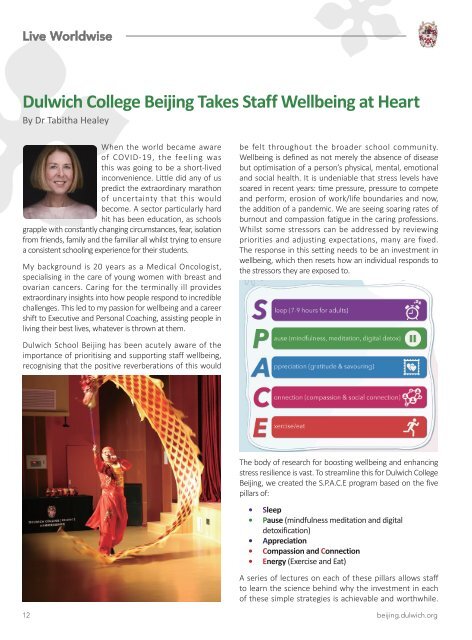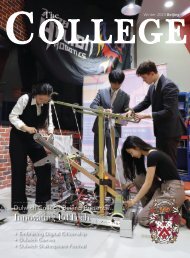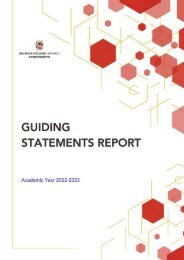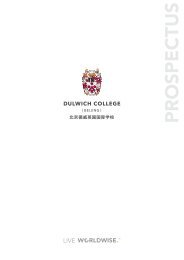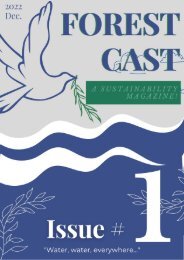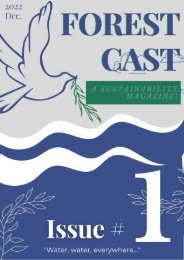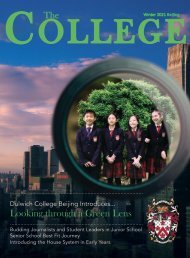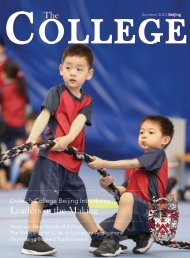The College Magazine Summer 2022
We have the pleasure to announce that our Summer 2022 edition of The College Magazine is now available! Some of the students from DCB Senior School Global Goals Club will take you through a student-led journey to global citizenship and share some of the projects they successfully launched in the past school year. Student leadership is a broad concept that encourages every student to take ownership and responsibilities. You will read about programmes and activities that are provided in DCB Early Years to foster student agency from a younger age. Junior School Student Council share their creative initiatives, including 'No Carbon November'. The Dulwich Dudes Podcast and Magazine team from Junior School reflect their first year of journalism activities. Check out their thoughts and ideas! Some of the 2022 graduates share insights that they have gained through the university application journey.
We have the pleasure to announce that our Summer 2022 edition of The College Magazine is now available!
Some of the students from DCB Senior School Global Goals Club will take you through a student-led journey to global citizenship and share some of the projects they successfully launched in the past school year.
Student leadership is a broad concept that encourages every student to take ownership and responsibilities. You will read about programmes and activities that are provided in DCB Early Years to foster student agency from a younger age.
Junior School Student Council share their creative initiatives, including 'No Carbon November'. The Dulwich Dudes Podcast and Magazine team from Junior School reflect their first year of journalism activities. Check out their thoughts and ideas!
Some of the 2022 graduates share insights that they have gained through the university application journey.
Create successful ePaper yourself
Turn your PDF publications into a flip-book with our unique Google optimized e-Paper software.
Live Worldwise<br />
Live Worldwise<br />
Dulwich <strong>College</strong> Beijing Takes Staff Wellbeing at Heart<br />
By Dr Tabitha Healey<br />
When the world became aware<br />
of COVID-19, the feeling was<br />
this was going to be a short-lived<br />
inconvenience. Little did any of us<br />
predict the extraordinary marathon<br />
of uncertainty that this would<br />
become. A sector particularly hard<br />
hit has been education, as schools<br />
grapple with constantly changing circumstances, fear, isolation<br />
from friends, family and the familiar all whilst trying to ensure<br />
a consistent schooling experience for their students.<br />
My background is 20 years as a Medical Oncologist,<br />
specialising in the care of young women with breast and<br />
ovarian cancers. Caring for the terminally ill provides<br />
extraordinary insights into how people respond to incredible<br />
challenges. This led to my passion for wellbeing and a career<br />
shift to Executive and Personal Coaching, assisting people in<br />
living their best lives, whatever is thrown at them.<br />
Dulwich School Beijing has been acutely aware of the<br />
importance of prioritising and supporting staff wellbeing,<br />
recognising that the positive reverberations of this would<br />
be felt throughout the broader school community.<br />
Wellbeing is defined as not merely the absence of disease<br />
but optimisation of a person’s physical, mental, emotional<br />
and social health. It is undeniable that stress levels have<br />
soared in recent years: time pressure, pressure to compete<br />
and perform, erosion of work/life boundaries and now,<br />
the addition of a pandemic. We are seeing soaring rates of<br />
burnout and compassion fatigue in the caring professions.<br />
Whilst some stressors can be addressed by reviewing<br />
priorities and adjusting expectations, many are fixed.<br />
<strong>The</strong> response in this setting needs to be an investment in<br />
wellbeing, which then resets how an individual responds to<br />
the stressors they are exposed to.<br />
<strong>The</strong> body of research for boosting wellbeing and enhancing<br />
stress resilience is vast. To streamline this for Dulwich <strong>College</strong><br />
Beijing, we created the S.P.A.C.E program based on the five<br />
pillars of:<br />
• Sleep<br />
• Pause (mindfulness meditation and digital<br />
detoxification)<br />
• Appreciation<br />
• Compassion and Connection<br />
• Energy (Exercise and Eat)<br />
A series of lectures on each of these pillars allows staff<br />
to learn the science behind why the investment in each<br />
of these simple strategies is achievable and worthwhile.<br />
Behavioural change is then encouraged by participation<br />
in follow-up activities, all whilst strengthening community<br />
through group participation.<br />
Each of these pillars has been demonstrated to<br />
downregulate stress hormones, improve the way our brain<br />
functions and reduce long term wear and tear on our DNA,<br />
thus reducing ageing and illness. <strong>The</strong>y are all free, simple<br />
and readily accessible: it simply comes down to whether we<br />
make them a priority or not.<br />
So, what are the shifts that you can make to overhaul your<br />
wellbeing and strengthen your ability to tolerate stress and<br />
uncertainty? Sleep is vital and a routine essential. Where<br />
possible going to sleep and getting up at the same time<br />
each day, aiming for 7-9 hours and exposing yourself to 10<br />
minutes of natural light in the morning will transform the<br />
quality of your sleep and set you up for the day.<br />
Pausing to take 10-15 minutes to sit quietly with your<br />
thoughts, allowing them to pass and then return to<br />
focussing on your breath, has been demonstrated to reduce<br />
stress, anxiety and depression, increase concentration<br />
and creativity and remarkably improve immune function<br />
and reduce pain. <strong>The</strong> greatest barrier to achieving quiet<br />
is our relationship with technology, and I implore you to<br />
review how you interact with your devices. Are you actively<br />
engaged online or simply mindlessly scrolling? Research<br />
reports that we check our phones every 12 minutes. We<br />
spend 5 minutes sorting a task, it then takes 23 minutes to<br />
return to our previous level of productivity. So, in fact, we<br />
are never actually achieving optimal performance.<br />
Appreciation of what we have rather than what we don’t,<br />
and expressing gratitude for this, increases life satisfaction,<br />
improves relationships and reduces toxic emotions and<br />
stress. Write down three things for which you are grateful<br />
before bed, share gratitude with family and friends or take a<br />
photo each day that allows you to savour the simple things<br />
for which we are all grateful. As you practice gratitude, you<br />
will find that, like exercising a muscle, it becomes easier,<br />
stronger and your natural state.<br />
We are all hardwired for connection, love and belonging.<br />
Shockingly, loneliness (a lack of meaningful relationships)<br />
has been estimated to shorten life span by 15 years and<br />
has higher mortality than smoking, diabetes or obesity<br />
due to the release of the stress hormone cortisol and the<br />
impact this has on the body. When we are overwhelmed<br />
and stressed, the first thing we do is often to withdraw<br />
from human interaction, which sadly only exacerbates<br />
our distress. Rewarding human connections requires<br />
a foundation of compassion: understanding another’s<br />
experience and providing assistance. Compassion makes<br />
the unbearable bearable, so look at your week and<br />
build in opportunities to be kind to yourself and connect<br />
compassionately with others.<br />
Finally, we turn to energy. We all know what it feels like to<br />
let our batteries run low, and yet I am reasonably confident<br />
that you would not allow that to happen to your phone.<br />
In order to thrive, we need to replenish our energy, which<br />
requires regular exercise and appropriate fuel. Schedule<br />
moderate-intensity exercise at least three times per week<br />
for 45 minutes or 3 x 15-minute sessions of high intensity,<br />
interval training. If you can, take your exercise outdoors as<br />
connecting with nature amplifies the benefits. Fuel your<br />
body with real food, preferably whole grain and plant-based,<br />
full of colour and variety.<br />
Congratulations must be given to the Dulwich <strong>College</strong> Beijing<br />
Wellbeing Committee, which has embraced the program<br />
and has already provided extraordinary opportunities for the<br />
staff to expand their minds, connect with others and invest<br />
in themselves.<br />
12 beijing.dulwich.org<br />
<strong>The</strong> <strong>College</strong> <strong>Magazine</strong> (Beijing)<br />
13


